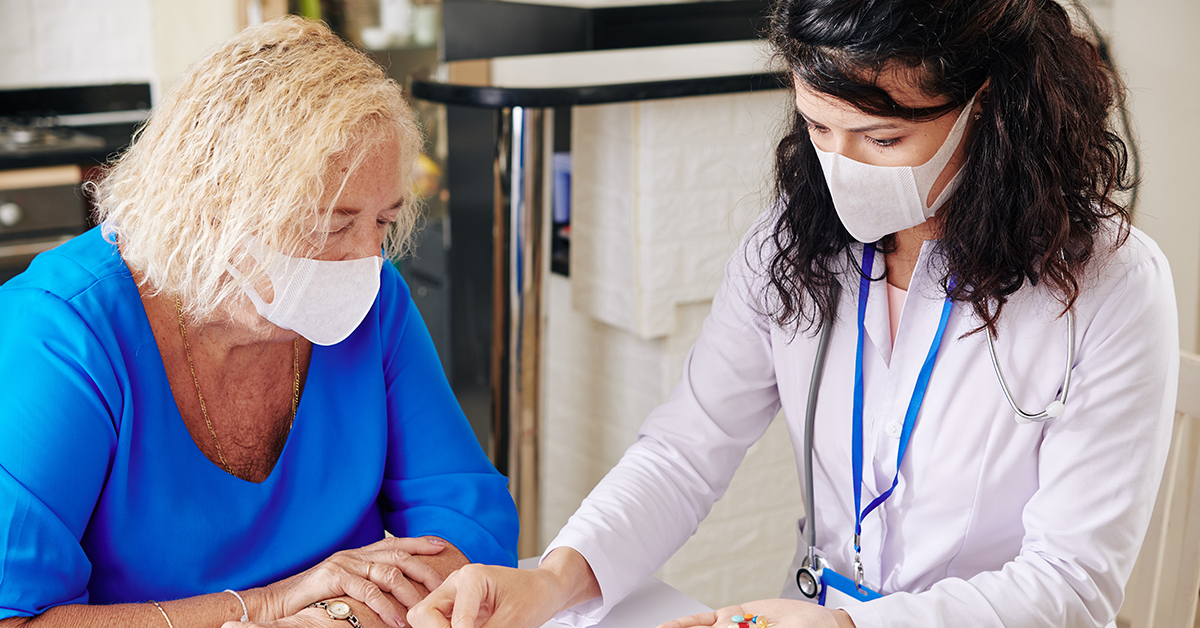
Pharmacists are strictly adhering to CDC guidelines regarding PPE to prevent the spread of COVID-19.
The COVID-19 pandemic continues to alter our daily lives across the country. As cities and states cautiously attempt a return to a “new normal,” we’ve been looking at the various ways this unusual time has affected the healthcare field and our day-to-day routines.
We spoke with Amie Blaszczyk, Pharm.D., about the role pharmacists play in caring for our elderly population in the time of COVID-19. Blaszczyk is an Associate Professor of Geriatric Pharmacy Practice and the Division Head of Geriatrics and Pediatrics at the TTUHSC Jerry H. Hodge School of Pharmacy on the Dallas/Fort Worth campus. She offers valuable advice for families with elderly loved ones who are living independently or in long-term care facilities, as well as the changes pharmacists have made in response to the pandemic.
Pharmacists’ Safety Protocol During COVID-19
The most notable change Blaszczyk points out is that pharmacists are strictly adhering to CDC guidelines regarding personal protective equipment (PPE) to prevent the spread of the virus.
In other words, pharmacists are wearing masks and gloves and enforcing social distancing.
A Pharmacist Duty: Providing COVID-19 Tests at Nursing Homes
As has been heavily reported, COVID-19 has been wreaking havoc in nursing homes and long-term care facilities.
“As soon as COVID comes into a nursing home, it is absolutely devastating,” Blaszczyk says.

Amie Blaszczyk, Pharm.D.
So, pharmacists are administering COVID-19 tests to nursing home residents and anyone who comes into the facility, including employees. Blaszczyk explains that this testing offers a baseline for finding the infection and determining who might be silent spreaders, providing a starting point for trying to contain the infection in this vulnerable population.
Blaszczyk stresses that, while a nursing home may feel like a hospital, it’s a place where people live. Yes, there are nurses on call and medical equipment at the ready, but there are also activity rooms and dining rooms typically filled with people socializing. A nursing home has always been a difficult place to contain a virus, and some residents might not remember or be familiar with the safety procedures, like wearing masks and regular hand washing. Blaszczyk points out the negative attention that nursing homes have received lately, but she is very fast to applaud the work that the medical professionals are doing day in and day out in those facilities.
“I like to say thank you every chance I get to the people on the frontline in the nursing homes,” she says.
Hear more from Dr. Blaszczyk about how pharmacists are working with their geriatric patients.
Advice for People Caring for the Elderly
“One of the things I always tell my students is that atypical presentation of a disease process is actually quite typical in the older adult population,” Blaszczyk explains.
These include COVID-19 symptoms like cough and fever. So, in an older adult, Blaszczyk advises to also look for unusual mental changes. These include confusion, getting lost, asking more questions than usual, feeling more lethargic or dizzy or falling down. If an elderly person has an elevated temperature, Blaszczyk advises to get in touch with a doctor about getting tested for COVID-19. And she stresses to continue following CDC guidelines for social distancing, wearing a mask and washing hands.
Should I Remove My Loved One From the Nursing Home?
Blaszczyk has spoken with many people who are considering taking their loved ones out of a long-term facility. It’s an understandable decision with the unknowns of the virus and the statistics about its spread through nursing homes. Blaszczyk simply advises to make this decision with caution and to remember that they are there for a reason: because they need care. Make sure you’ve thought about and put a plan in place for how your elderly loved one’s physical, mental and emotional needs will continue to be met. If those needs can be met, and taking them out of the facility is the right choice for your family, testing for COVID-19 is the first step.
As we continue to adapt to, learn about and fight this insidious virus, we are becoming
stronger and more united. We’ve seen scientists and industries coming together. We’ve
seen families and friends connecting via technology. Our elderly population deserves
our love, respect and care. We can help them most by following the safety guidelines
set out by the CDC and our medical professionals. ![]()


